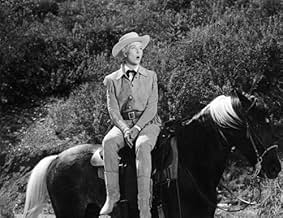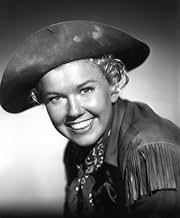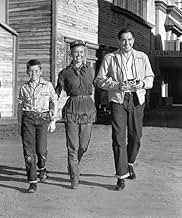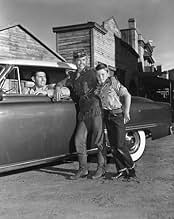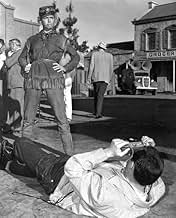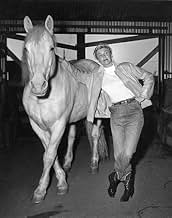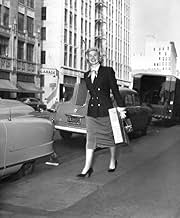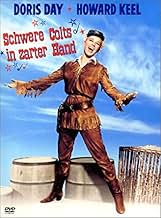AVALIAÇÃO DA IMDb
7,2/10
12 mil
SUA AVALIAÇÃO
A história de Calamity Jane, seu salão e seu romance com Wild Bill Hickok.A história de Calamity Jane, seu salão e seu romance com Wild Bill Hickok.A história de Calamity Jane, seu salão e seu romance com Wild Bill Hickok.
- Ganhou 1 Oscar
- 2 vitórias e 5 indicações no total
Allyn Ann McLerie
- Katie Brown
- (as Allyn McLerie)
Victor Adamson
- Barfly
- (não creditado)
Fred Aldrich
- Chicagoan
- (não creditado)
Leon Alton
- Townsman
- (não creditado)
Monya Andre
- Woman at Fort Dance
- (não creditado)
Beulah Archuletta
- Indian Woman in Saloon Balcony
- (não creditado)
Emile Avery
- Barfly
- (não creditado)
Mary Bayless
- Woman at Fort Dance
- (não creditado)
George Bell
- Barfly
- (não creditado)
Ray Bennett
- Officer at Fort Dance
- (não creditado)
Arthur Berkeley
- Bartender
- (não creditado)
Avaliações em destaque
... who else could put across the Deadwoodstageis number like Doris Day in the opening sequences of this wonderful movie? Right through to her mushy ballad 'Secret Love' she is perfect for the role of the butch cowgirl who gets a feminine makeover and snares her shooting buddy (the excellent Howard Keel, in fine voice here). Doris was a true star, a great actress and singer, game for a laugh and a pretty blonde who transcended her rather trite public image through her talent. Calamity Jane is possibly her best work, and certainly one of the best musical movies of the 1950s (against some pretty stiff competition). They might be making musicals again, but they won't make them quite like this.
The film is marvelous, but it's been dissected to death; consequently, I can't add any comment you haven't already heard. Lovely Technicolor cinematography of the outdoor frontier and rich period costuming enhances this top-notch cornucopia of story, score, and songs- including 'The Deadwood Stage,' 'I Can Do Without You,' 'Windy City,' 'The Subject of Harry,' and 'Secret Love.' Two special moments for me are Howard Keel singing 'Higher Than A Hawk' to the portrait of Allyn McLerie, and 'A Woman's Touch,' which shows McLerie and Doris Day become sisters in solidarity. They clean the house (in fact, renovate it) while discovering Calamity's femininity at the same time. They joke, they bond, and at the end of the scene our heroine is in a dress and quite the looker. There's no shocking sexist message here; it's a musical showing how a woman gets her man. I don't think in 1953 you could've asked for more. On the other hand, most of Day's scenes with Keel are a locked-horns battle of the sexes- absolutely no question. They compliment each other beautifully- from 'I Can Do Without You', right up to their nearly romantic duet of 'The Black Hills of Dakota.' Enjoy the film again, and look between the lines- some of it is quite timeless.
First and foremost, CALAMITY JANE is a fun musical. The 29-year-old Doris Day thoroughly enjoys herself in the central role as a gun-totin' tomboy, the fastest draw in the city of Deadwood, South Dakota - apart from Wild Bill Hickok (Howard Keel). She demonstrates an apparently limitless capacity for telling tall stories, as well as a unique ability to ride a horse. She and Keel make a lovable double-act, especially in their song "I Can Do Without You" - which is of course completely ironic in tone. They clearly cannot do without one another, as proved at the end of the film when they celebrate their nuptials. Sammy Fain and Paul Francis Webster's score contains at least two classics, "The Deadwood Stage (Whip Crack-Away," which opens and closes the film, and "Secret Love," a typically schmaltzy Day song that topped the charts on its initial release. Yet perhaps the film's most interesting aspect today is the way in which it embodies early Fifties attitudes towards gender. Calamity Jane's decision to don male attire is perceived as something aberrant; she is tolerated by her fellow-citizens of Deadwood, but no one really takes her very seriously. It is only when she is 'educated' in feminine ways by visiting singer Katie Brown (Allyn McLerie) that she understands what her 'proper' role should be. She should accept that females (unlike males) are capricious in nature, apt to make spontaneous decisions without rhyme or reason. In a ball scene towards the end of the film, Calamity appears in a long gown, her blonde hair neatly tied at the back - the male guests stare at her in disbelief, as if they cannot believe they have a "true" woman within their midst. Calamity feels uncomfortable in the role, and returns briefly to her male attire; but when the citizens refuse to speak to her later on (punishing her for her decision to banish Katie from their town), she understands the "error" of her ways. At the film's end she wears a bridal gown and tosses her six-shooter away, in symbolic acknowledgment that she should no longer try to adopt masculine attitudes. Rather she should accept her designated role as wife and (probably) mother.
Calamity Jane with Doris Day was my first experience with musicals. i was so entranced I talked my mother into letting me stay to watch it again. I was left with an unknown women who had come to watch the next showing. (Something unheard of in this day!) The sheer joy of the singing, dancing and innocence of a time past is something that is sorely missed today.
Doris Day's Calamity Jane is a story of love between men and women and women and women during a time when this love was innocent and people did not worry that someone might look at it in a sexual way. Women could hold hands and hug to support each other in happiness as well as grief.
Songs like 'Secret Love' and 'Take Me Back to the Black Hills' are beautiful even to the audiences today. this type of music will never die.
Doris Day's Calamity Jane is a story of love between men and women and women and women during a time when this love was innocent and people did not worry that someone might look at it in a sexual way. Women could hold hands and hug to support each other in happiness as well as grief.
Songs like 'Secret Love' and 'Take Me Back to the Black Hills' are beautiful even to the audiences today. this type of music will never die.
From her first appearance aboard the stagecoach, singing "Deadwood Stage," Doris Day dominates the movie in exuberantpossibly too exuberantfashion, with strong assistance from Howard Keel and his virile voice
Returning home from a visit to Chicago, Day gives her account of the "Windy City" in a song that suggests Oklahoma!'s "Kansas City" in more ways than the title Her quarrelsome duet with Wild Bill"I Can Do Without You"echoes Annie Oakley's competitive duet with Frank Butler in "Annie Get Your Gun."
But one song is all Doris Day'sand the film'svery own: walking through the countryside on a beautiful morning, Calamity realizes that she loves Bill, and in a voice exuding warmth and tender feeling, she sings the Academy Award-winning song "Secret Love."
Returning home from a visit to Chicago, Day gives her account of the "Windy City" in a song that suggests Oklahoma!'s "Kansas City" in more ways than the title Her quarrelsome duet with Wild Bill"I Can Do Without You"echoes Annie Oakley's competitive duet with Frank Butler in "Annie Get Your Gun."
But one song is all Doris Day'sand the film'svery own: walking through the countryside on a beautiful morning, Calamity realizes that she loves Bill, and in a voice exuding warmth and tender feeling, she sings the Academy Award-winning song "Secret Love."
Você sabia?
- CuriosidadesDoris Day recorded the song "Secret Love" in only one take.
- Erros de gravaçãoAfter leaving the ball at the fort, we cut to a shot of Calamity's bare back as she is undressing. Once she gets the dress off she is shown wearing undergarments that clearly cover most of her back.
- Citações
[the singer is a man in drag]
Wild Bill Hickok: She ain't very good lookin'
Calamity Jane: That ain't all she ain't.
- Versões alternativasThere is an Italian edition of this film on DVD, distributed by DNA Srl: "AMORE SOTTO COPERTA (1948) + CALAMITY JANE (Non sparare baciami, 1953)" (2 Films on a single DVD), re-edited with the contribution of film historian Riccardo Cusin. This version is also available for streaming on some platforms.
- ConexõesFeatured in The Doris Mary Anne Kappelhoff Special (1971)
- Trilhas sonorasThe Deadwood Stage (Whip-Crack-Away)
Written by Sammy Fain
Lyrics by Paul Francis Webster
Sung and whistled by chorus behind credits, then sung by Doris Day and chorus
Principais escolhas
Faça login para avaliar e ver a lista de recomendações personalizadas
Detalhes
Bilheteria
- Faturamento bruto mundial
- US$ 9.215
- Tempo de duração
- 1 h 41 min(101 min)
- Proporção
- 1.37 : 1
Contribua para esta página
Sugerir uma alteração ou adicionar conteúdo ausente


